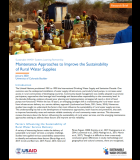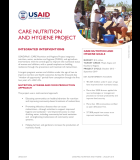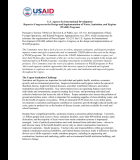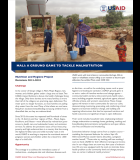Strengthening Partnerships, Results, and Innovations in Nutrition Globally – Mali (SPRING-Mali)
SPRING/Mali officially launched in December 2014 with the support of Helen Keller International (HKI). USAID/Mali tasked the project with improving the nutritional status of women and children, with a special emphasis on building resilience in the Mopti Region through the prevention and treatment of undernutrition while targeting the critical “1,000 days” of pregnancy and a child’s first two years. During the 15 months the project was operational in Mopti, the project forged important partnerships with local government institutions and implementing partners (IPs) and provided nutrition-sensitive and nutrition-specific services to over 165,723 community members. SPRING/Mali developed an integrated program and received funding from USAID’s health, economic growth, and water and sanitation sources.
Activity Description
Working across 20 focus communes in the Feed the Future zone of influence in the Mopti Region, SPRING utilized community platforms to promote improved agricultural practices, nutrition-sensitive agriculture practices, and key water, sanitation and hygiene (WASH) behaviors to project beneficiaries. The project employed an integrated approach to ensure that community members received practical trainings and thoughtful engagement that incorporated elements of agriculture, nutrition, and WASH with social and behavior change communication.
SPRING/Mali rolled out three distinct, multi-sectoral activities: farmer nutrition schools (FNS), trainings in essential nutrition actions and essential hygiene actions (ENA/EHA), and community-led total sanitation (CLTS):
- The FNS platform integrated improved behaviors in nutrition, WASH, and nutrition-sensitive agriculture into trainings for local farmers in improved vegetable gardening techniques. By the project’s end, the project completed four FNS modules, training 500 FNS leaders focused on improved practices for vegetable production and promoted nutrition-sensitive agriculture practices; these leaders in turn trained 5,000 additional farmers from their respective villages.
- To build facility-level and community-level capacity in nutrition and hygiene, the project trained over 375 facility-based providers and community health workers and volunteers in ENA/EHA. SPRING supplemented the existing Ministry of Health and Hygiene (MOH&H)-approved ENA training curriculum used in Mali with the hygiene component, ensuring an integrated and comprehensive curriculum.
SPRING/Mali staff, in coordination with the local sanitation department, helped to establish 4,894 handwashing stations with soap and, having assessed the sanitation needs of more than 50 villages, implemented CLTS in 26 villages, ultimately certifying 20 villages open defecation free (ODF) by project’s end.
Expected Outcomes
- Increased access to diverse and quality foods
- Increased access to quality nutrition services
- Increased demand for key agriculture, nutrition, and water, sanitation, and hygiene (WASH)- related practices and services
Actual Outcomes
- 500 SPRING-trained FNS leaders reached an additional 5,000 beneficiary farmers (4,824 women and 176 men) with nutrition-sensitive agriculture messages through the cascade approach, yielding a total of 5,500 participants trained between June 2015 and February 2016.
- SPRING successfully triggered 26 villages/hamlets in CLTS, ultimately certifying 20 of them (77 percent) open defecation free.
- SPRING facilitated the repair and establishment of nearly 1,000 latrines across 2,285 households and declared 20 communities ODF.
- SPRING helped construct 4,894 tippy taps across 2,447 households during the life of the project





